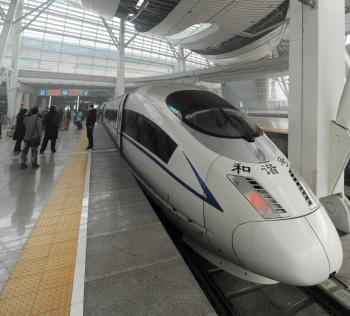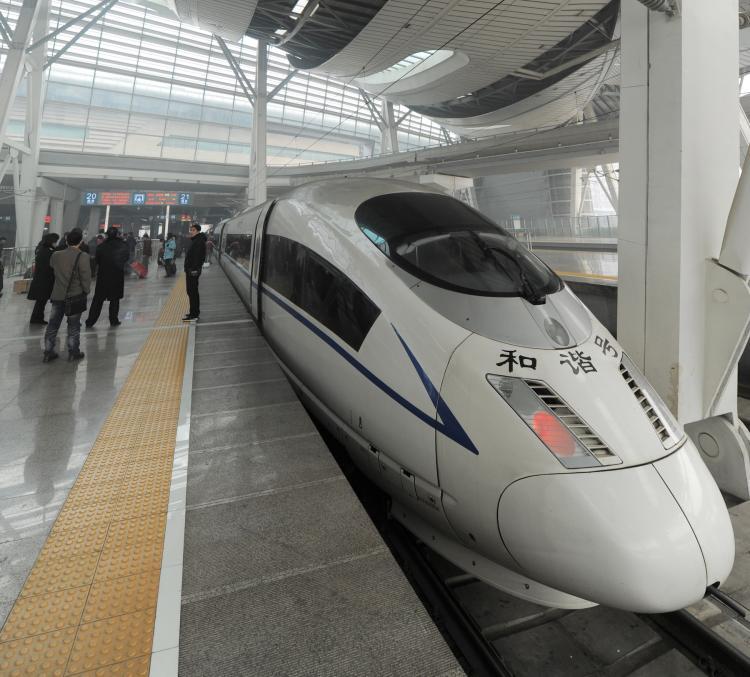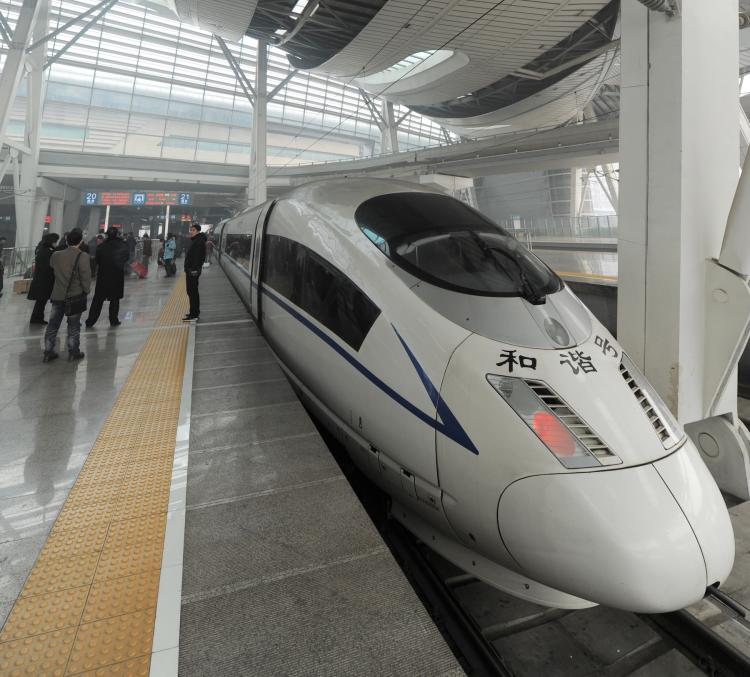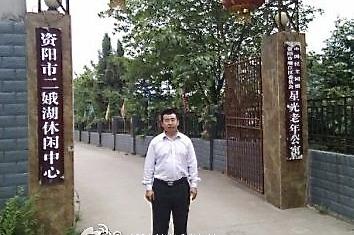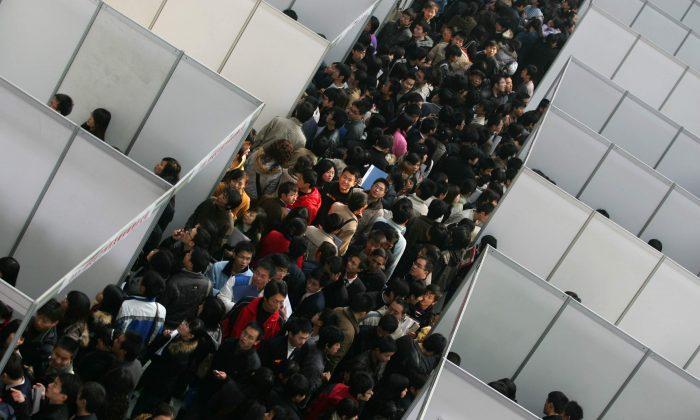Chinese railway authorities are going to lower the speed and drop the price of some high-speed rail services in China amidst lingering concerns over the safety and soundness of the rail network, according to recent reports.
Scheduled to debut in late June of this year, the Beijing-to-Shanghai high-speed railway’s speed will be lowered to 300 km (186 miles)/hour: down from the original design capacity of 380km(236 miles)/hour, Beijing Daily reported on April 20.
Slower trains will be programmed to run at 250 km/hour on the same track, tacking on an additional 50 minutes for a one-way trip. Tickets will be priced lower and in an effort to offset costs, authorities will replace airplane-style adjustable seats on the new trains with standard train seats.
Other high-speed railway lines will be similarly affected. In an interview on April 12 with state-run People’s Daily , Minister of Railways Sheng Guangzu explained that the drastic changes aim to improve safety and affordability. He did not elaborate on the difference in pricing or impact on operating costs.
Safety concerns over the high-speed railway were published on Feb. 22 in a People’s Daily article. Official Du Junxiao questioned the short construction cycle of railways, suggesting that potential hazards could exist, owing to inadequate safety measures taken during construction. The article was re-published by other official media and numerous international media sources.
Last year, a volley of criticism was set off by an article published on July 22, 2010 by the party’s mouthpiece, Xinhua, addressing the high-speed railway’s exorbitant pricing and low rate of utilization.
The article came on the heels of the arrest on corruption charges of former Railways Ministry head, Liu Zhijun. Liu initiated the construction of the world’s largest high-speed railway network in 2003, shortly after his appointment to the position, enabling its development to progress with unprecedented speed.
Chinese authorities reported that the construction scheme had also plunged the ministry into debt to the tune of 1.3 trillion yuan (US$200 billion).
Prior to Liu’s removal, his ambitious plan for the high-speed railway system had been utilized to advertise China’s booming economic and technological development.
Now the regime’s media outlets are acclaiming his successor’s slow-down policies. Many sources have quoted Sheng Guangzu as saying that railway construction should not develop “too far ahead of our time.”
Sheng’s new policies have raised doubt and dissent among citizens. While from the superficial standpoint most people welcome lower prices, many bloggers consider the underlying motivation behind promoting slowing down: veiled acknowledgement of safety concerns.
Also in question is the waste associated with the decrease in speed. “The railway was built upon high speed standards, which cost tons of money,” said Tianya.cn blogger Caoluyuebi. “But now the high speed can’t be realized. What a huge waste of tax payer money.”
Blogger Xinyue1024 doubted the rationale behind replacing adjustable seats on the Beijing-Shanghai trains. “Does that really save any money? By removing the seats, how can you recoup what has already been spent on them?”
By the end of 2010, China had 8358 km (5,193 miles) of high-speed railway in use: one third of the world’s total length. Chinese media reports that by 2015, authorities plan to expand the network to 16,000 km (9,941 miles).
[email protected]
Scheduled to debut in late June of this year, the Beijing-to-Shanghai high-speed railway’s speed will be lowered to 300 km (186 miles)/hour: down from the original design capacity of 380km(236 miles)/hour, Beijing Daily reported on April 20.
Slower trains will be programmed to run at 250 km/hour on the same track, tacking on an additional 50 minutes for a one-way trip. Tickets will be priced lower and in an effort to offset costs, authorities will replace airplane-style adjustable seats on the new trains with standard train seats.
Other high-speed railway lines will be similarly affected. In an interview on April 12 with state-run People’s Daily , Minister of Railways Sheng Guangzu explained that the drastic changes aim to improve safety and affordability. He did not elaborate on the difference in pricing or impact on operating costs.
Safety concerns over the high-speed railway were published on Feb. 22 in a People’s Daily article. Official Du Junxiao questioned the short construction cycle of railways, suggesting that potential hazards could exist, owing to inadequate safety measures taken during construction. The article was re-published by other official media and numerous international media sources.
Last year, a volley of criticism was set off by an article published on July 22, 2010 by the party’s mouthpiece, Xinhua, addressing the high-speed railway’s exorbitant pricing and low rate of utilization.
The article came on the heels of the arrest on corruption charges of former Railways Ministry head, Liu Zhijun. Liu initiated the construction of the world’s largest high-speed railway network in 2003, shortly after his appointment to the position, enabling its development to progress with unprecedented speed.
Chinese authorities reported that the construction scheme had also plunged the ministry into debt to the tune of 1.3 trillion yuan (US$200 billion).
Prior to Liu’s removal, his ambitious plan for the high-speed railway system had been utilized to advertise China’s booming economic and technological development.
Now the regime’s media outlets are acclaiming his successor’s slow-down policies. Many sources have quoted Sheng Guangzu as saying that railway construction should not develop “too far ahead of our time.”
Sheng’s new policies have raised doubt and dissent among citizens. While from the superficial standpoint most people welcome lower prices, many bloggers consider the underlying motivation behind promoting slowing down: veiled acknowledgement of safety concerns.
Also in question is the waste associated with the decrease in speed. “The railway was built upon high speed standards, which cost tons of money,” said Tianya.cn blogger Caoluyuebi. “But now the high speed can’t be realized. What a huge waste of tax payer money.”
Blogger Xinyue1024 doubted the rationale behind replacing adjustable seats on the Beijing-Shanghai trains. “Does that really save any money? By removing the seats, how can you recoup what has already been spent on them?”
By the end of 2010, China had 8358 km (5,193 miles) of high-speed railway in use: one third of the world’s total length. Chinese media reports that by 2015, authorities plan to expand the network to 16,000 km (9,941 miles).
[email protected]
